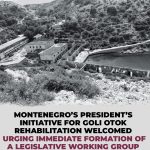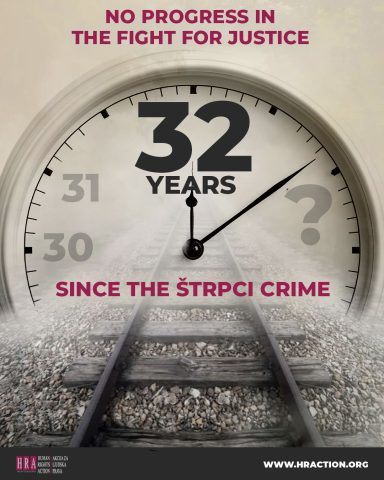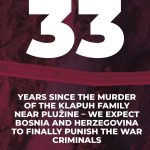
MONTENEGRO’S PRESIDENT’S INITIATIVE FOR GOLI OTOK REHABILITATION WELCOMED – URGING IMMEDIATE FORMATION OF A LEGISLATIVE WORKING GROUP
26/02/2025
HISTORIC DECISION IN MONTENEGRO – CIVILIAN WAR VICTIMS FINALLY RECOGNIZED, FAMILIES GRANTED RIGHT TO SOCIAL PROTECTION AND PROMISE OF COMPENSATION
28/02/2025NO PROGRESS IN THE FIGHT FOR JUSTICE: 32 YEARS SINCE THE ŠTRPCI CRIME

Today marks the 32nd anniversary of the war crime involving the abduction of passengers from a train in Štrpci.
The Human Rights Action (HRA) reiterates its appeal for the prosecution of all perpetrators and those who ordered the crime, for concrete actions to be taken to locate all the bodies of the victims, and for the families of the victims to finally be granted the status of civilian victims of war along with adequate compensation due to the decades-long delay in regulating this status.
On February 27, 1993, members of the Army of the Republic of Srpska stopped train No. 671 at the Štrpci railway station in Bosnia and Herzegovina, operating on the Belgrade–Bar route. They abducted 20 passengers, robbed and killed them solely because they were not of Serbian origin, and threw their bodies into the Drina River.
The victims were: Esad Kapetanović, Iljaz Ličina, Fehim Bakija, Šećo Softić, Rifat Husović, Halil Zupčević, Senad Đečević, Jusuf Rastoder, Ismet Babačić, Tomo Buzov, Adem Alomerović, Muhedin Hanić, Safet Preljević, Džafer Topuzović, Rasim Ćorić, Fikret Memović, Fevzija Zeković, Nijazim Kajević, Zvjezdan Zuličić, and one unidentified person of African origin. The oldest victim was 59 years old, and the youngest was 16. Eight of the twenty victims were from Montenegro. To date, only the remains of four victims have been found: Halil Zupčević, Rasim Ćorić, Jusuf Rastoder, and Iljaz Ličina.
Human Rights Action (HRA) appeals to the state prosecutors in the Republic of Serbia and Montenegro to prosecute the perpetrators and the remaining direct executors of this crime.
We urge the Missing Persons Commissions of Montenegro, Bosnia and Herzegovina, and the Republic of Serbia to jointly undertake a thorough search for the remains of the victims in Lake Perućac.
We call on the Members of Parliament of Montenegro to unanimously adopt amendments to the Law on Veterans’ and Disability Protection, along with accompanying amendments, during today’s session. These amendments would systematically recognize all civilian war victims and grant their families the right to social protection in Montenegro, which has been available to the families of fallen soldiers from the 1990s wars since 1998, for 27 years.
By adopting this law, Montenegro would recognize the status of civilian war victims for all those abducted in Štrpci, which would represent an important civilizational step forward. On the other hand, the Republic of Serbia is still far from doing the same – the victims of the kidnapping are “punished” because they did not perish on the territory of the Republic of Serbia and because they were killed by the Army of the Republic of Srpska, which Serbia considers a friendly army.
We also expect the Government of Montenegro to support the promise made by the Minister of Social Welfare, Family Care, and Demography, Damir Gutić, that the families of civilian war victims will be compensated for the decades-long delay in legal regulation, thereby at least partially rectifying the injustice done to them.
In 2024, HRA conducted a public opinion survey, which showed that only slightly more than a third of citizens (38.8%) were correctly informed about the Štrpci crime. We believe it is necessary to include this crime in the history curriculum to ensure that people in this region never again suffer because of their origin.
To date, 10 individuals have been definitively convicted for the Štrpci crime – one in Montenegro and nine in Bosnia and Herzegovina.
The trial in Serbia for the members of the Bosnian Serb paramilitary formations – Ljubiša Vasiljević, Duško Vasiljević, Gojko Lukić, Jovan Lipovac, and Dragana Đekić – began in 2019. In the meantime, two of the accused, Ljubiša Vasiljević and Jovan Lipovac, have passed away, and their cases were discontinued. In the first-instance verdict by the Higher Court in Belgrade, Vasiljević and Lukić were sentenced to 10 years in prison each for crimes against civilians, while Dragana Đekić was sentenced to five years for the same offense. However, on October 30, 2023, the Court of Appeals in Belgrade overturned this verdict and sent the case back for reconsideration. The new trial was supposed to begin in January 2024, but this did not happen, and the case remains at its starting point.
In the criminal proceedings conducted against Nebojša Ranisavljević in Montenegro, it was established that the kidnapping in Štrpci was planned and executed with the knowledge of the high-ranking officials of the civil, police, and military organs of Serbia and FR Yugoslavia at the time. A meeting was held with the attendance of Baško Petrić, head of the Ministry of the Interior for Užice, Đorđe Kerić, commander of the Užice police region, and Mitar Mandić, Drago Tadić, and Vuko Mulina from ŽTP, where it was concluded: “The information about the intention to abduct the passengers from the train is confirmed and it is added that this is a strategic operation of the Serbian army to create conditions for the exchange of prisoners and the dead…”
Documents published during the trial in Bijelo Polje, gathered and published by the Humanitarian Law Center, indicate that both Ranisavljević and his commander, Milan Lukić, were executors of the crime, with the order coming from someone higher up in the government of the then Federal Republic of Yugoslavia, which consisted of Serbia and Montenegro, in cooperation with the authorities of the Republic of Srpska. However, to date, no one among the masterminds and organizers of this crime has been charged.
Two years ago, HRA called on the Special State Prosecutor’s Office (SPO) to expand the investigation in this case to include new perpetrators, organizers, and those who ordered the crime, as well as those who knew in advance that the kidnapping of passengers would take place but did nothing to prevent it.
In response to this request, the SPO launched an inquiry, which is still ongoing, and from which we are still expecting concrete results. HRA provided the prosecutor’s office with the names of all those mentioned by Ranisavljević in his testimony as participants in the operation: “Montenegrin,” “Drunk Slovenian,” Milan “Čačak,” Aca Šimšić, Željko Marjanović, Bogdan Šekarić, Vidaković, Tanović, Goran (Roma origin), and Mitar “Četnik.” These individuals had already been reported by attorneys Dragan Prelević and Aleksandar Cvejić in 1998, who were hired by the Humanitarian Law Center from Belgrade to represent the victims’ families.
Milan Lukić, the commander of the “Avengers,” was sentenced to life imprisonment by the International Criminal Tribunal for his involvement in other crimes, including two mass murders of civilians, whom he burned alive in houses in two locations in Višegrad. However, he has not yet been tried for the kidnapping and murder of passengers from the train in Štrpci, although he was indicted for this crime by the Court of Bosnia and Herzegovina in 2019.
Human Rights Action has published selected testimonies about the kidnapping of passengers from the train in Štrpci in the book “Against Oblivion”, where the accounts of a man who opposed the abduction of his companion, a relative of an abducted passenger who spoke with Milan Lukić, a woman who witnessed the abduction of her husband, a conductor and train dispatcher from the Štrpci station are presented. Finally, the testimony of convicted perpetrator Nebojša Ranisavljević is included, who detailed how the crime was carried out.
In memory of the victims of the Štrpci kidnapping, their closest relatives, friends, and citizens will today lay flowers at the memorials in Podgorica, at Pobrežje, at 10:00 a.m., and in Bijelo Polje at 1:00 p.m.
Human Rights Action will attend these gatherings.






 English
English